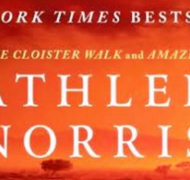Learning to Embrace Boredom: An Interview With Kathleen Norris
Blog / Produced by The High Calling
In Acedia & Me, award winning poet and New York Times bestselling author Kathleen Norris probes ancient Christian texts for a psychological, theological and literary exploration of acedia (ah-SEE-dia). Dictionary definitions of “acedia” use broad terms such as apathy, boredom, or torpor. However, Norris explores the varying shades of acedia including weariness, sorrow, melancholy, despair, ennui, restlessness, listlessness, impasse, and futility. In light of today’s shifting economy where too many people find themselves underemployed or unemployed, Norris offers some gentle insights for those who feel they have fallen into a spiritual rut with no redemptive light in sight.
What is acedia?
Acedia is a very ancient concept. The word is Greek and essentially means not caring. It's a very cold form of indifference to everything.
What prompted you to write the book Acedia & Me?
One of the reasons I wrote the book was so I could go through the classics like Dante's Inferno and see how people described acedia and how they talked about it. I first experienced acedia when I was about 15 years old, but it wasn't until about another 15 years that I found a word for this when I was at a monastery library. I remember the monks being somewhat bemused when I made this discovery because this was a term they’re familiar with, but it's not a known concept outside of monastic circles. I figured there were other people who were like me, not having a name for this. Once we know the name of something, it gives us some power over it. Since the book came out, I get letters from people who experience the symptoms of acedia, they just never had a name for it.
How does acedia impact one's career?
We enter into a vocation with high hopes. But after years go by, it can turn into a daily grind and we become indifferent to things that once mattered.
When I was in the middle of finishing Acedia & Me, I took my developmentally disabled sister to see Wanted. I take her to the movies a lot and I end up seeing a lot of stupid movies that I wouldn't see otherwise. Anyway, in the first five minutes of film, there's a character sitting in an office cubicle in Chicago. He's talking about how he's just going through the motions and says, “It's gotten to the point that I don't care that I can't care.” This is a classic textbook definition of acedia. The George Clooney character in Up in the Air is another example of acedia in the workplace. You can look at him and say, he's not depressed. But the character is living in a way that fosters an indifference to a homelife, a family, and other things that should matter.
Have you noticed that people with a creative spirit are especially prone to acedia?
A lot of creative types live with a controlled bipolar condition. They often don't need medication but they need to learn how to live a life that isn't controlled by their creative cycles. Most writers and artists I know can do this very well. When acedia strikes a creative person, it can be really devastating because they start to think they will never create again, so why bother.
The editor I've worked with on most of my books told me that almost always when a writer says to her, “My brain is dead. I'm really stupid. I can't think of anything,” it almost always means that there's a significant breakthrough around the corner. From the darkness that seems totally impenetrable, you can come out with something that’s really great.
What are some ways one can contend with acedia in the workplace especially when one is in a job that doesn't provide a sense of fulfillment?
I know people who are underemployed or unemployed and have done crazy things to hold on to whatever job they have. It's a scary world. I think you need to make sure that you have something in your life that really does have meaning. If it isn’t your vocation, it can be relationships with family and community. This is where I think churches and faith communities can play such an important part. If you don’t have the family ties you used to have, what do you have? So I think faith communities, groups of common interests, hobbies and other things like that are forms of self-care to make sure you've got something in your life. All sorts of things can help us remember that isn’t all about us and our moods. There's a world out there that needs our attention and our love, as well as wonder.
How then can people contend with a sudden crisis such as being laid off from a job with limited or no prospects in sight? They are no longer living the life they envisioned and find themselves going on autopilot just so they can get through the day.
Talking to a disinterested third party like a counselor can help. But also ask yourself, “What do I really want? Do I want a job that’s fulfilling in ways other than financial? How much do I really need in order to have this life that I want?” For a lot of people, scaling down is a big part of it. They used to think that they needed the big house and the three cars but they're realizing that they don’t need all that. Continue to ask questions of yourself. Don't think that those questions aren't important. It's not letting that voice that says this is meaningless have the last word. It's saying, “I can't see it now. But I know there's something that does matter, that will matter. I can make a go of it.”
But sometimes there are situations that aren't going to get any better.
Some experiences are hell on earth. When I read about someone who is a caregiver for someone in a nursing home or is facing a real medical crisis, I think well for 15 years, that kind of defined my life. There really are these things that you just have to go through them. Maybe because I've been through them, I can help others go through this.
Talk about the concept of “bad thoughts” that you bring up in your book.
The early monks never use the word “sin” but they speak about “bad thoughts.” Everybody has bad thoughts. Rather than judge yourself, examine your thoughts as they arise and ask questions about them. For example, if you feel envy towards someone, think about why you're envious.
How does one move from looking at life to living it when every day seems to consist of the same boring work routine?
One of the key things especially with acedia is not to see about the foreseeable future. Living in the present is one of the ways to get rid of the bad thoughts. You might not be in some place where you want to be. But you don’t need to fixate on something you don’t have. Instead, say to yourself, “OK, I'm here. I'd like to be where this person is. What are the constructive steps I need to do to get there?” Living in the present means not trying to project into the future or going into nostalgia for the past. People that reminisce about how great their earlier years are compared to where they are today are probably painting the past with a lot more of a sort of false glow than it really has.
How do we help people in the workplace see new possibilities when the career trajectory they may have dreamed about isn't going to happen?
Being able to dream but also being realistic is enormously important. Don't let negative voices have primacy, but think of what you can do. Often there's a very simple path out of that negative spiral. With acedia, you just give up any hope that there is any path at all. You withdraw. You retreat. You think, “OK, there's nothing there. I'll just go through the motions.” It really does become a dead end and there's no goal because nothing matters.
The monks believed that with all the vices, you can work through the bad thoughts and reach the other side. Like with anger, the other side is compassion. If you're angry about something, it means you really care. So you can start to look at a situation with compassion. With acedia, the opposite is love. So you can start to do what is required of you to love because love requires commitment and work.
How can community, friends and family help alleviate acedia?
Acedia is a great disconnector. It will disconnect you from the people and things that used to matter. So maintaining your connections is super important. Those things are really lifesavers especially if you're prone to something like acedia. One of the worst things with acedia is that you kind of know that it should matter and that it used to matter but you're kind of helpless to deal with it. You just say, “There's nothing here anymore.”
Why do you say our greatest spiritual blessings are found in every day trials and tasks?
Living 24 hours a day and figuring out how to not waste it is probably the ultimate challenge. The psalms are great. When I discovered monastic life, I found that the daily reading of the psalms was a real grounding for me. So, I can always return to that if I go astray. I know they're there and they'll help. Things like sunrise, sunsets, and the sound that rain is stuff that's there. We can ignore or appreciate it. When we stop to appreciate something, that's a little boost that helps with all our bad thoughts.
What can we learn from the ancient monks living in monasteries that can help us in the 21st century workplace?
It's so inspiring to me when I go to a monastery. Their fidelity to daily life is so amazing. In some cases, this community has been there for over a thousand years. They’re faithful to their house and walking a spiritual path, as well as living together with other people who drive them crazy. It's the fidelity to the dailiness of it and not giving up hope that's so inspiring. That's why I love to go to monasteries. I'm sitting in the choir and I'm saying, “God, I don’t know if can stand this for another 15 minutes. This is pretty boring.” Then I say to myself, “Shut up.” This has been going on in this place for 150 years or more. That is beyond belief sometimes, I just sit there and go “wow.”
But does this translate to the workforce for people, who can't afford to go away to a monastery?
What are their commitments to their families, coworkers and other people? Basically a monastic community is a group of people that have all come together to practice this in a particular way. But we all have the daily grind that we can turn into a spiritual path where we can remain faithful to these things that we've made a commitment to in our every day lives. That means something. It has a spiritual dimension.
Post by Becky Garrison, author of Jesus Died for This?: A Satirist's Search for the Risen Christ











